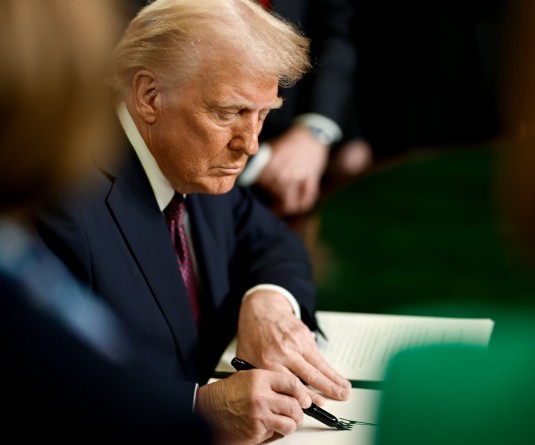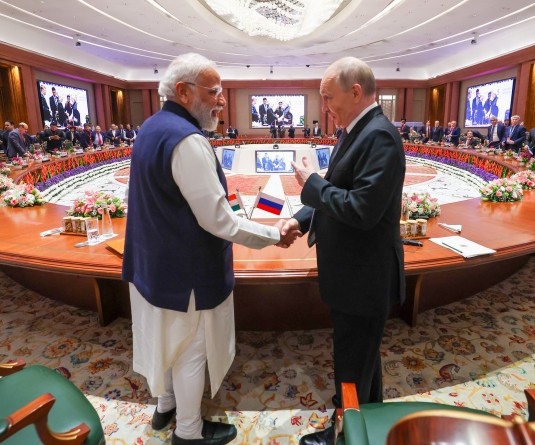
(LEFT): Pakistani paramilitary soldiers gather around a damaged bus at the site of a bomb blast in Karachi, Pakistan on Tuesday, April 26. Twin bomb attacks against Pakistani navy buses that were talking employees to work on Tuesday killed at least four people and wounded more than 50 others. (RIGHT): Pakistani volunteers carry a dead body of a bomb blast victim in Karachi, Pakistan. (AP Photos)
KARACHI, April 26 (AFP): Bomb attacks hit two buses carrying Pakistani navy officials in Karachi on Tuesday, killing four people in the latest sign of rampant insecurity in a nation key to US hopes of beating the Taliban.
Nearly 60 people were wounded when remote-controlled bombs exploded beside the buses at rush hour in different parts of Pakistan's politically tense economic capital, used by NATO to ship supplies to troops in Afghanistan.
Attacks on Pakistani security personnel are rare in Karachi and Tuesday's assaults come one day after leaked documents showed US investigators considered Pakistan's military intelligence agency to be a terrorist group. Officials said four people were killed in the attacks and the navy, which is based largely in Karachi, identified them all as its employees. "The four dead were navy officials including a lady doctor, a sub lieutenant, a sailor and a civilian employee," navy spokesman Commander Salman Ali told AFP. "Fifty-seven people were injured in the two attacks and of them, 50 were navy officials," he added.
Provincial government official Sharfuddin Memon told AFP that the first bomb was planted on a motorbike parked in the upmarket Defence Housing Scheme and the second hidden in rubbish in the impoverished Baldia town neighbourhood. Intelligence officials said that the bombs were triggered by remote control near buses carrying naval personnel.
Authorities quickly fingered extremist Islamist organisations linked to the Taliban and Al-Qaeda, such as Lashkar-i-Jhangvi, which was involved in the Karachi kidnap and beheading of US journalist Daniel Pearl in 2002.
Bomb attacks have killed more than 4,200 people across the country since July 2007, and the United States considers Pakistan's northwestern border areas with Afghanistan the global headquarters of Al-Qaeda. "We suspect the signature of terrorist organisations like Jundallah or Lashkar-e-Jhangvi," Memon told AFP.
Prime Minister Yousuf Raza Gilani, whose government is allied to Washington, condemned the attack, saying it "cannot deter the resolve of the nation and our armed forces to curb the menace of militancy and extremism". Television footage of the scene showed navy passenger buses with smashed-out windows and the remains of a destroyed motorcycle, as security officials collected the debris and marshalled the rescue effort.
Karachi is home to Pakistan's stock exchange and a lifeline for a depressed economy wilting under inflation and stagnating foreign investment. But the city of 16 million is plagued by ethnic and sectarian killings, crime and kidnappings.
It is scored with rivalries between the Urdu-speaking majority and an influx of Pashtuns from the northwest, and outbreaks of political violence in Karachi killed more than 150 people last year.
In the neighbouring province of Baluchistan, armed men attacked and set fire to a passenger bus late Monday, killing at least 13 people in an incident apparently unrelated to the Karachi attacks. Local police official Akbar Shahwani told AFP that those burnt alive included four children and three women.
The attack took place on the main highway at Sibbi, 180 kilometres (110 miles) southeast of Quetta, capital of oil- and gas-rich Baluchistan, which has been troubled by violence and which borders Iran and Afghanistan. Pakistan is a key ally of the United States against the Taliban but deep mistrust between the two countries' intelligence agencies was laid bare this week with the leak of a 2007 US list of "terrorist and terrorist support entities" that included Pakistan's Inter-Services Intelligence.
The ISI appeared with some 70 other groups, including Iranian intelligence and the Taliban, on a memo from the US camp for war prisoners at Guantanamo Bay that was released by anti-secrecy website WikiLeaks. The exposure of the private US assessment may cause new strains in the relationship between the United States and ISI, which has longstanding ties to militants but has also worked closely with the CIA.
Pakistan helped create the Taliban, who imposed an austere brand of Islam on Afghanistan until the 2001 US-led invasion removed them from power. Islamabad has received billions of dollars in US aid in the past decade and bristles at suggestions it is playing a double game.
Nearly 60 people were wounded when remote-controlled bombs exploded beside the buses at rush hour in different parts of Pakistan's politically tense economic capital, used by NATO to ship supplies to troops in Afghanistan.
Attacks on Pakistani security personnel are rare in Karachi and Tuesday's assaults come one day after leaked documents showed US investigators considered Pakistan's military intelligence agency to be a terrorist group. Officials said four people were killed in the attacks and the navy, which is based largely in Karachi, identified them all as its employees. "The four dead were navy officials including a lady doctor, a sub lieutenant, a sailor and a civilian employee," navy spokesman Commander Salman Ali told AFP. "Fifty-seven people were injured in the two attacks and of them, 50 were navy officials," he added.
Provincial government official Sharfuddin Memon told AFP that the first bomb was planted on a motorbike parked in the upmarket Defence Housing Scheme and the second hidden in rubbish in the impoverished Baldia town neighbourhood. Intelligence officials said that the bombs were triggered by remote control near buses carrying naval personnel.
Authorities quickly fingered extremist Islamist organisations linked to the Taliban and Al-Qaeda, such as Lashkar-i-Jhangvi, which was involved in the Karachi kidnap and beheading of US journalist Daniel Pearl in 2002.
Bomb attacks have killed more than 4,200 people across the country since July 2007, and the United States considers Pakistan's northwestern border areas with Afghanistan the global headquarters of Al-Qaeda. "We suspect the signature of terrorist organisations like Jundallah or Lashkar-e-Jhangvi," Memon told AFP.
Prime Minister Yousuf Raza Gilani, whose government is allied to Washington, condemned the attack, saying it "cannot deter the resolve of the nation and our armed forces to curb the menace of militancy and extremism". Television footage of the scene showed navy passenger buses with smashed-out windows and the remains of a destroyed motorcycle, as security officials collected the debris and marshalled the rescue effort.
Karachi is home to Pakistan's stock exchange and a lifeline for a depressed economy wilting under inflation and stagnating foreign investment. But the city of 16 million is plagued by ethnic and sectarian killings, crime and kidnappings.
It is scored with rivalries between the Urdu-speaking majority and an influx of Pashtuns from the northwest, and outbreaks of political violence in Karachi killed more than 150 people last year.
In the neighbouring province of Baluchistan, armed men attacked and set fire to a passenger bus late Monday, killing at least 13 people in an incident apparently unrelated to the Karachi attacks. Local police official Akbar Shahwani told AFP that those burnt alive included four children and three women.
The attack took place on the main highway at Sibbi, 180 kilometres (110 miles) southeast of Quetta, capital of oil- and gas-rich Baluchistan, which has been troubled by violence and which borders Iran and Afghanistan. Pakistan is a key ally of the United States against the Taliban but deep mistrust between the two countries' intelligence agencies was laid bare this week with the leak of a 2007 US list of "terrorist and terrorist support entities" that included Pakistan's Inter-Services Intelligence.
The ISI appeared with some 70 other groups, including Iranian intelligence and the Taliban, on a memo from the US camp for war prisoners at Guantanamo Bay that was released by anti-secrecy website WikiLeaks. The exposure of the private US assessment may cause new strains in the relationship between the United States and ISI, which has longstanding ties to militants but has also worked closely with the CIA.
Pakistan helped create the Taliban, who imposed an austere brand of Islam on Afghanistan until the 2001 US-led invasion removed them from power. Islamabad has received billions of dollars in US aid in the past decade and bristles at suggestions it is playing a double game.






